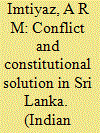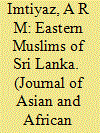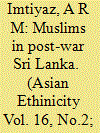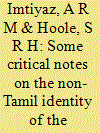| Srl | Item |
| 1 |
ID:
059532


|
|
|
| 2 |
ID:
090214


|
|
|
|
|
| Publication |
2009.
|
| Summary/Abstract |
Conflict in Sri Lanka between the Tamils and the Sinhalese brought the Eastern Muslims into the crossfire. Muslim elites and politicians generally cooperate with the Sinhalese ruling class. Such cohabitation irritated the Tamils. Since 1985, relations between the Tamils and the Muslims in the Eastern region have become strained, and Muslims claimed they have some problems to be solved. This study attempts to identify some special problems of the Eastern Muslims. A questionnaire on the special problems of the Eastern Muslims was distributed to the Eastern youth, students, unemployed Muslims and farmers. The population of the target group was selected randomly. More than 150 questionnaires were issued with a 75 percent response rate. Interviews were also conducted on the phone with an educated section of the Eastern Muslims. This study also suggests solutions to the protracted ethno-political conflict based on power sharing.
|
|
|
|
|
|
|
|
|
|
|
|
|
|
|
|
| 3 |
ID:
137222


|
|
|
|
|
| Summary/Abstract |
This study attempts to understand the recent mobilization against the Sri Lankan Muslim community by Sinhala-Buddhist organizations. In doing so, it adds to the discussion about the relationship between second-order minorities and the state and how identities can be manipulated pre- and post-conflict. States, led by majority ethnic groups, may choose to work with second-order minorities out of convenience in times of crisis and then dispose of them afterwards. The article will attempt to look critically at some state concessions to Muslim political leaders who supported successive Sri Lanka’s ruling classes from the independence through the defeat of the Tamil Tigers in 2009. It will also examine the root causes of the Sinhala-Buddhist anti-Muslim campaigns. Finally, it will discuss grassroots perspectives by analysing the questionnaire on the anti-Islam/Muslim campaign that was distributed to youth, students, unemployed Muslims and workers in the North-Western and Western provinces.
|
|
|
|
|
|
|
|
|
|
|
|
|
|
|
|
| 4 |
ID:
105905


|
|
|
|
|
| Publication |
2011.
|
| Summary/Abstract |
The ethnic civil war between the Tamil and Sinhalese communities that ravaged Sri Lanka in the late twentieth and early twenty-first centuries and which ended in May 2009 has attracted great interest from scholars of ethnic identity. Both the Tamil and Sinhalese ethnic groups employ language-Tamil and Sinhalese-as their primary ethnic marker to support their distinct ethnic formations. As for the Muslims, while the vast majority living in the north and east share many things with the Tamils there including the Tamil language, Muslims in the south have divergent interests based more on trade and commerce. Under a predominantly southern leadership, the Muslims who speak the Tamil language with some borrowed Arabic words seek a social formation based on religion to win a distinct ethnic recognition-distinct from the Tamil ethnic group. The result has been a deep rift between the Muslims and the Tamils, making a permanent solution to Sri Lanka's problems elusive. These issues have been relatively under-researched. This study looks at Sri Lankan Muslim identity and the Muslims' relations with Tamils. In particular it interrogates some aspects of the identity discourse developed over the years by the south-centred Muslim elites who align with the Sinhalese political class. We argue that the Tamils' northern leadership has been insensitive to Muslims-that they have played into the hands of the Colombo government by persecuting Muslims in their midst on the pretext of responding to government-instigated violence among local Muslim youths.
|
|
|
|
|
|
|
|
|
|
|
|
|
|
|
|